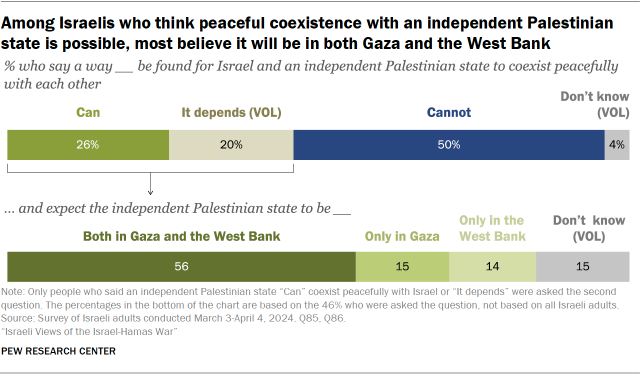Despite their mixed opinions about the military response to Hamas and concerns about the war expanding and going on a long time, most Israelis were confident in our recent survey (conducted in March and early April) that their country will achieve its war aims. By roughly two to one, more feel optimistic than pessimistic about the future of Israel’s national security.
However, this optimism does not extend to the prospect of peaceful coexistence alongside a Palestinian state, which Israelis now see as less likely than they did in recent years. A plurality of Israelis also think that Israel should govern the Gaza Strip after the war.
Success against Hamas
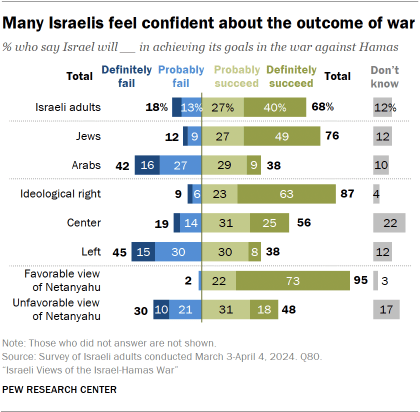
About two-thirds of the Israeli public believes Israel will achieve its goals in the war against Hamas. The largest share says that Israel will definitely succeed (40%) while 27% says Israel will probably succeed. Another 18% think Israel will probably or definitely fail.
About three-quarters of Israeli Jews believe the country will achieve its goals in the war, while Israeli Arabs are far less certain. More than a third of Israeli Arabs believe the country will be successful, but 42% believe it will fail and 19% are not sure.
Optimism about Israel’s prospects in the war is widespread among right-leaning Israelis – and particularly among people who have a favorable view of Netanyahu. Fully 95% of Netanyahu supporters express confidence in the eventual success of their country’s military campaign against Hamas.
More than half of centrist Israelis are similarly optimistic, but another quarter of them are not sure. Left-leaning Israelis have a different outlook: The largest share (45%) say Israel will definitely or probably fail.
Israelis who believe that the military response to Hamas has been about right are more likely to say Israel will succeed (86%) than those who think it has not gone far enough (76%) and those who think it has gone too far (25%). Indeed, among those who think Israel has gone too far, more think the country will fail in its war against Hamas than succeed (55% vs. 25%).
Israel’s future national security
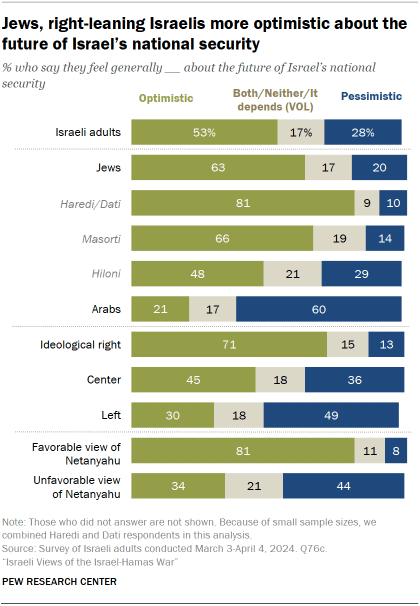
Thinking about the future, 53% of Israelis say they feel generally optimistic about their country’s national security. This is almost double the share of Israelis who say they feel pessimistic (28%). Another 17% are not sure.
Jewish Israelis are three times as likely as Arab Israelis to have a positive outlook on the future of national security: 63% of Jews say they are optimistic, while only 21% of Arabs agree.
Among Israeli Jews, those who are more religiously observant express a greater degree of optimism for the future of Israel’s security. About eight-in-ten Haredi (“ultra-Orthodox”) and Dati (“religious”) Jews say they are optimistic, compared to about half of Hiloni (“secular”) Jews. Among Hiloni Jews, another 29% say they are pessimistic and 21% volunteer another answer.
Those on the ideological right are much more likely to feel positively about the future of national security than those on the left or in the center. About seven-in-ten right-leaning Israelis are optimistic, while less than half of those in the center and less than a third of those on the left feel the same.
Israeli adults who have a favorable view of Netanyahu are significantly more optimistic about the future of the country’s security than are those who view him unfavorably (81% vs. 34%). More broadly, supporters of the emergency unity government (which includes the original coalition as well as former opposition party National Unity, led by war cabinet member Benny Gantz) are also more optimistic than those who do not support the unity government (75% vs. 27%).
The future of Gaza
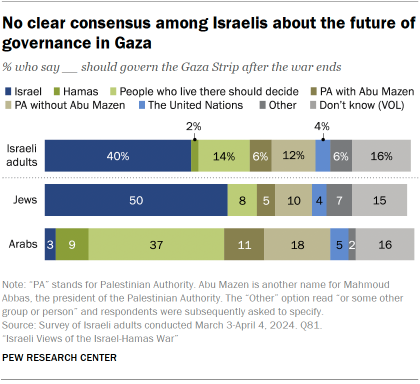
Four-in-ten Israelis believe Israel should govern the Gaza Strip after the war ends. Others believe Gaza should be under control of the Palestinian Authority, whether with Mahmoud Abbas (also known as Abu Mazen) in leadership (6%) or without him (12%). An additional 14% say the people who live in Gaza should decide who governs them, while smaller shares mention the United Nations (4%) or Hamas (2%), and 16% say they do not know.
Governance by Israel
- Israeli Jews are much more likely than Israeli Arabs to say that Israel should control Gaza (50% vs. 3%).
- A large majority (77%) of Haredi and Dati Jews would prefer that Gaza be under Israeli control, while only 28% of Hiloni Jews agree.
- Among right-leaning Israelis, approximately seven-in-ten believe Israel should govern Gaza. Only 16% of those in the center and 6% on the left agree.
Self-determination
- Over a third of Israeli Arabs say that the question of governance should be decided by the people who live in Gaza. Only 8% of Israeli Jews agree.
- Three-in-ten Israelis on the ideological left say Gazans should decide who governs them. Among center-leaning Israelis, 17% feel the same. Just 4% of those who position themselves on the ideological right support self-determination for Gazans.
Governance by the Palestinian Authority, Hamas or third parties
- Israeli Arabs are more likely than Jews to support a Palestinian Authority national unity government, either with Abbas’ leadership (11% vs. 5%) or without Abbas (18% vs. 10%). They are also more supportive than Israeli Jews of Hamas regaining control over the Gaza strip (9% vs. 0%).
- Older Arabs in Israel (ages 50 and older) are more supportive of Hamas’ leadership in Gaza than are those ages 18 to 49 (15% vs. 6%).
Views of Palestinian leaders
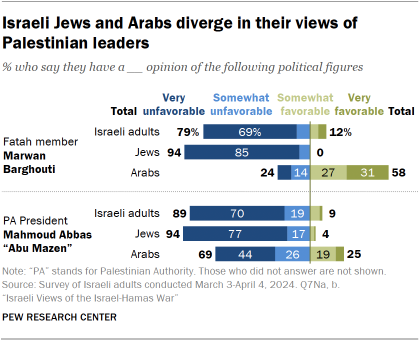
On the whole, few Israelis have favorable views of the two Palestinian leaders we asked about.
In the case of Mahmoud Abbas (also known as Abu Mazen), president of the Palestinian Authority, only 9% of Israelis say they see him in a positive light. This is largely unchanged since Pew Research Center last asked about him in 2015.
Similarly, only 12% of Israelis have favorable views of Abbas’ fellow Fatah member, Marwan Barghouti, who has been detained by Israel since 2002.
While Abbas is more popular among Arab Israelis (25%) than Jewish Israelis (4%), he is still seen more unfavorably than not among Arabs. In the case of Barghouti, however, he is broadly popular with Arab Israelis (58%), while fewer than 1% of Jewish Israelis see him in a positive light.
Palestinian statehood and coexistence
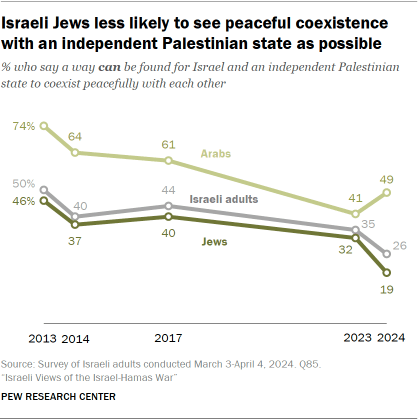
Around a quarter of Israelis (26%) think a way can be found for Israel and an independent Palestinian state to coexist peacefully with each other. Half think this is not possible, while another 20% say it depends.
The feeling that peaceful coexistence is possible has decreased 9 percentage points since last year and 24 points since we began asking the question in 2013.
Notably, nearly all of the decline since last year is due to Jewish Israelis shifting their opinions: Today, 19% of Jews think peaceful coexistence is possible, down from 32% who said the same in 2023. In contrast, Arab Israelis have grown slightly more optimistic about peaceful coexistence, with 49% saying it’s possible, up from 41% last year.
Opinion about peaceful coexistence also differs across the ideological spectrum: 60% of those who place themselves on the left think it’s possible, compared with 33% of those in the center and 8% of those on the right. The shift from last year has been particularly sharp among Israelis in the ideological center, falling 20 points, compared with a drop of 13 points on the left and 6 points on the right.
Hiloni Jews are split on the question of peaceful coexistence. About a third (34%) think it is possible – much higher than the share of Haredim and Datiim who agree (3% each). Roughly a third of Hilonim say coexistence is not possible.
Where would the Palestinian state be?
Because the Israel-Hamas war is still ongoing and the meaning of “an independent Palestinian state” may have changed for respondents, we also asked a new follow-up question. Those who said peaceful coexistence was possible or who volunteered “it depends,” were asked: “Would you expect the independent Palestinian state to be in the West Bank, in Gaza or both?”
A majority of those who think a Palestinian state may be possible believe that it will be in both the West Bank and Gaza, while smaller (and similar) shares expect it to be only in Gaza or only in the West Bank. The remainder either do not know or think peaceful coexistence between an independent Palestinian state and Israel is unlikely.
Arab Israelis are more likely than Jewish Israelis to think a Palestinian state will be in both places. Jews are more likely than Arabs to say it would be only in Gaza or that they are unsure.
Israelis on the left are much more likely to anticipate an independent Palestinian state in both the West Bank and Gaza than are those in the center or on the right. Those on the right are more likely to foresee an independent Palestinian state in Gaza only.
